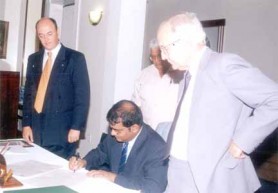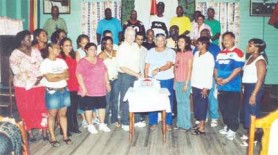(Remarks at the commencement of the Second Special Consultations on the Caricom Single Market and Economy at Sam Lord’s Castle, St Phillip, Barbados, November 20-21, 2000)
Perhaps because of the still bitter experience of the failed federation of the West Indies, or perhaps because of the strong underlying insular and parochial attitudes that persist, the leaders of Caricom have consistently refused to consider or discuss any form of political union, even one that falls short of federation. Yet, as Dr Havelock Brewster has pointed out on more than one occasion, cultural identity is a crucial part of the West Indian reality. Without moving towards some overt political expression of this reality there is a real danger that the single market and economy will not be achieved or will be overtaken by events… Dr Brewster had proposed a union of West Indian states which would provide West Indian citizenship without prejudice to the sovereignty of the individual states.

It is absurd to ignore the political dimension, as the regional political leaders continually insist on doing, and to treat economic integration as essentially an exercise in functional cooperation. There has to be some rationale, some driving force to provide the energy to break the bottlenecks and provide the momentum that has so far been lacking. If the leaders have no broader vision there will be no future. Though there are those who may argue that though there was a common history and culture there are significant variations, particularly in terms of recent historical experience, and that Jamaica’s geopolitical situation and geographical distance would make this exercise nothing more than a genuflection to a failed idea. Surely the idea should have been fully discussed to see if some compromise could have been reached, to create an ideology for integration.
Seen in this context, the admission of Haiti and Suriname as members was at least very badly timed. This makes any form of political union more difficult and thus more unlikely. Moreover, broadening was obviously going to make deepening more difficult, especially involving as it did other languages and systems. And what are the implications for the Caribbean Court of Justice; how will the common law we have inherited and developed sit with these other jurisdictions? Participation in the Association of Caribbean States was also a distraction, putting a demand on scarce resources.
Guyanese for many years had a jaundiced view of Caricom because of its failure to take on board the lack of electoral democracy in Guyana from 1968 to 1992. That was seen as a fundamental compromise of its integrity, and the scars remain. Partly for that very reason, perhaps, the post-1992 government has made several mistakes, such as failing to back the candidacy of a Caricom candidate for an international post. It is now more aware of the need for solidarity on some issues. Indeed, there was disenchantment over the failure of Caricom to condemn Surinamese aggression in the recent incident with the oil rig. That also weakened the credibility of Caricom in the larger diplomatic arena. It is true that there is nothing in the Treaty of Chaguaramas that covers an incident like that between two of its members, and of course Suriname was admitted without Guyana insisting on a resolution of the border dispute. But the failure to censure Suriname’s gunboat intervention was surely unacceptable.

There are many other problems. The unanimity rule has clearly been a crippling impediment, forcing the community to progress at the pace of the laggards. Caricom interventions in Guyana and St Vincent were useful precedents in principle of a willingness to get involved in situations where there is internal unrest in member states though they led to the substantial shortening of the lives of two governments and in the former case there has been inadequate follow up in the process initiated by the Herdmanston Accord. There is no Caricom minister in Guyana, deputed to deal specifically with Caricom related issues and to push its programmes, nor in several other territories. This was one of the valuable recommendations of the West Indian Commission. The progress towards free movement in the region has been painfully slow and Guyanese in particular have suffered from this. With proper organisation, as the Caribbean Rice Association has pointed out, the 1.2 million tonnes of rice produced in the region could supply its annual consumption including Cuba and the Dominican Republic. And Guyana, of course, with a relatively undeveloped manufacturing sector and completely open economy, more so than that of Barbados, has so far benefited less from Caricom than some others.
We all know how slow progress has been, how many commitments have been broken. The time for action report of the commission in 1992 had identified 1994 as the date for the single market and economy.
Dr Vaughan Lewis has a valuable insight when he noted in a symposium in 1997 that the European political directorate had ceded to the European Commission certain institutionalised rights of initiative that appeared to place the European Commissioners “Almost on par with the heads of government as political actors and interveners in the political process.” He contrasted this with the situation in Caricom where the politicians retained complete control. As he said, “Nothing like primus inter pares must seem to be institutionalised between the political and the technocratic leadership of the region.” He also noted that the majority of the presidents of the European Union had not just been technocrats “manning, implementing or executing institutions, but in one sense or another were what might be called ‘men of politics.’ Men who had at one time or other played in the political arena at relatively important levels.” He referred to Roy Jenkins, Jacques Delors and others. This deliberate institutional weakening of the secretariat explains the refusal to accept and set up the Caribbean Commission, recommended by the West Indian Commission, to secure the implementation of decisions. The leaders do not want any body that can seriously challenge their sovereignty.
The establishment of the Regional Negotiating Machinery in Barbados with independent funding, under the extremely able and experienced Sir Shridath Ramphal, though desperately needed and long overdue, dealing with issues vital to the economic survival of Caricom, can also be seen as a competing administrative centre with the secretariat, itself often languishing for funds.
It is time we call a spade a spade, and as far as I know Prime Minister Owen Arthur has gone closer to doing this than any other politician in the region. Without political will progress will continue to be slow. How often do politicians talk in their own countries to their own people about the potential value of Caricom; summits have become ritual affairs where important issues are routinely shelved.
The media needs to get more involved in the debate on Caricom. Perhaps because the secretariat is in Georgetown we have tended to give it more coverage than most, and we had at one stage assigned a special reporter to cover the work of the secretariat. But a lot more can be done by the media to popularise the issues and discuss frankly some of the problems involved. The working document for this consultation shows that a considerable amount of work has been done. Hopefully, we can emerge with some ideas for accelerating the progress to a Caricom single market and economy.
It is a pleasure to be in Barbados – what Dr Lloyd Best would describe as one of the parishes in the Caribbean. How nice it would be to be here as a West Indian citizen, with all the rights that would entail, as it does in Europe.

